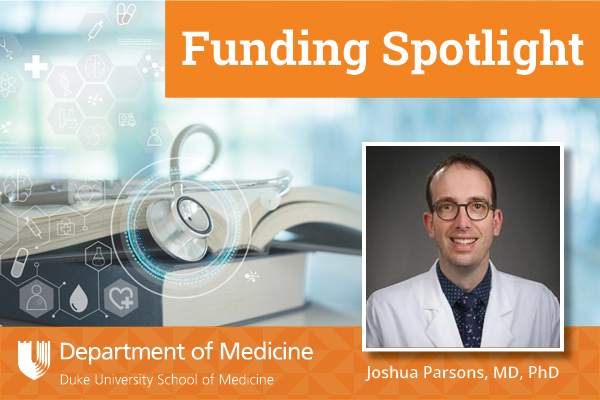
Joshua Parsons, MD, PhD, assistant professor of medicine in the Division of Infectious Diseases in Duke’s Department of Medicine, has received a $900,000 NIH K08 award to investigate the genomic factors contributing to antibiotic resistance and poor clinical outcomes in Staphylococcus aureus bloodstream infections. Over the next five years, this funding will enable Dr. Parsons to dedicate 75% of his time to advancing independent research into one of the deadliest bacterial pathogens.
S. aureus bloodstream infections are both common and lethal, with a mortality rate of approximately 25%. “At Duke, we see a patient diagnosed with S. aureus bloodstream infection almost every other day,” said Dr. Parsons. “Despite our best efforts, antibiotics frequently fail, leading to persistent infections, recurrence, and death.” His research focuses on understanding why some strains of S. aureus cause more severe disease and how genomic changes in the bacteria contribute to treatment failures.
A cornerstone of this research is Duke’s S. aureus Bacteremia Group (SABG) biorepository, the largest collection of S. aureus bloodstream isolates in the world, created and maintained by Dr. Parsons’ mentor, Vance Fowler. This unique resource includes bacterial samples, patient immune cells, and genomic data with clinical outcomes, providing a comprehensive foundation for study.
With the support of the NIH award, Dr. Parsons and collaborators at the University of Melbourne, including Stefano Giulieri and Benjamin Howden, are conducting the world’s largest bacterial genome-wide association study (bGWAS) on 3,500 S. aureus isolates. This work integrates whole-genome sequencing with clinical data to identify specific genomic signatures linked to antibiotic failure. Simultaneously, Dr. Parsons has developed an in-vivo evolution model in mice to study how S. aureus adapts within the host to become more pathogenic and resistant to treatment.
“This research not only sheds light on why current antibiotics fail but also opens doors to developing new therapeutic approaches,” said Dr. Parsons. Potential applications include identifying high-risk isolates in clinical microbiology labs to enable more aggressive and targeted treatments, as well as uncovering bacterial pathways that could serve as novel drug targets.
Dr. Vance Fowler, Dr. Parsons’ mentor at Duke, and the collaborators in Melbourne are integral to the project’s success. Together, the team is poised to make significant strides in understanding and combating one of the most challenging infections facing modern medicine, ultimately advancing our ability to manage and treat these life-threatening diseases.